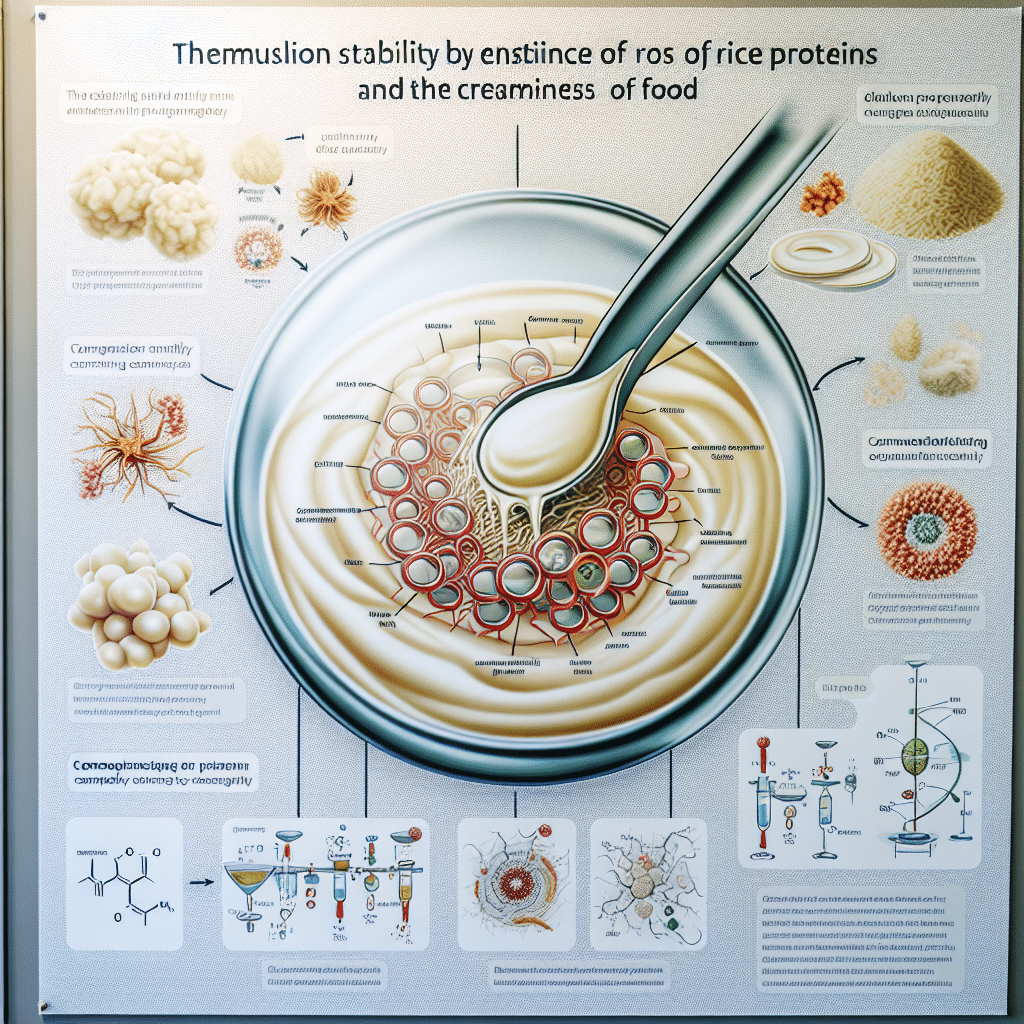Emulsion Stability of Rice Proteins: Key to Creaminess
-
Table of Contents
- Emulsion Stability of Rice Proteins: Enhancing Creaminess in Food Products
- Understanding Emulsion Stability
- The Role of Rice Proteins in Emulsion Stability
- Optimizing Rice Protein Functionality
- Case Studies and Examples
- Challenges and Future Directions
- Statistical Insights
- Conclusion: Key Takeaways on Rice Protein Emulsion Stability
- Discover ETprotein’s Premium Rice Proteins
Emulsion Stability of Rice Proteins: Enhancing Creaminess in Food Products

The quest for the perfect creamy texture in food products is a journey that has long fascinated food scientists and manufacturers. In recent years, the spotlight has turned to plant-based proteins, with rice protein emerging as a key player. The emulsion stability of rice proteins is a critical factor that determines the creaminess and overall sensory appeal of various food products. This article delves into the science behind emulsion stability, the role of rice proteins in creating creamy textures, and how this knowledge can be applied to develop superior food products.
Understanding Emulsion Stability
Before we explore the specifics of rice proteins, it’s essential to understand what emulsion stability means. An emulsion is a mixture of two immiscible liquids, such as oil and water, where one is dispersed in the other in the form of tiny droplets. Emulsion stability refers to the ability of these droplets to remain evenly distributed without separating over time. This stability is crucial for the texture, mouthfeel, and shelf-life of many food products, including dressings, sauces, and dairy alternatives.
The Role of Rice Proteins in Emulsion Stability
Rice proteins have gained popularity as a hypoallergenic and vegan-friendly alternative to traditional animal-based proteins. Their unique properties make them particularly useful in stabilizing emulsions:
- Surface Activity: Rice proteins can adsorb at the oil-water interface, reducing interfacial tension and helping to stabilize the emulsion.
- Viscosity: They contribute to the overall viscosity of the emulsion, which can prevent the coalescence of oil droplets.
- Charge: The electric charge on rice protein molecules can lead to repulsion between droplets, further enhancing stability.
These characteristics are key to achieving the desired creaminess in food products. However, the functionality of rice proteins in emulsions can be influenced by factors such as pH, ionic strength, and processing conditions.
Optimizing Rice Protein Functionality
To maximize the emulsifying properties of rice proteins, several strategies can be employed:
- pH Adjustment: Altering the pH can change the protein’s charge and solubility, affecting emulsion stability.
- Enzymatic Modification: Enzymes can be used to modify the structure of rice proteins, potentially improving their emulsifying properties.
- High-Pressure Processing: Applying high pressure can unfold protein molecules, increasing their surface activity.
By fine-tuning these parameters, food scientists can create rice protein-based emulsions with enhanced creaminess and stability.
Case Studies and Examples
Several studies have demonstrated the potential of rice proteins in food applications. For instance, research has shown that rice protein isolates can effectively stabilize oil-in-water emulsions, making them suitable for use in creamy dressings and sauces. Additionally, rice proteins have been successfully incorporated into dairy-free ice creams, providing a creamy texture that rivals that of traditional milk-based products.
Challenges and Future Directions
Despite the promising properties of rice proteins, there are challenges to overcome. One issue is the potential for off-flavors, which can be addressed through purification or flavor masking techniques. Another challenge is the variability in protein quality due to differences in rice varieties and processing methods. Ongoing research and innovation are focused on optimizing rice protein extraction and functionality to ensure consistent, high-quality emulsions.
Statistical Insights
The demand for plant-based proteins is on the rise, with the global rice protein market expected to grow significantly in the coming years. According to a report by Grand View Research, the market size was valued at USD 198.5 million in 2020 and is projected to expand at a compound annual growth rate (CAGR) of 8.8% from 2021 to 2028. This growth is driven by increasing consumer interest in health, wellness, and sustainable food sources.
Conclusion: Key Takeaways on Rice Protein Emulsion Stability
In summary, the emulsion stability of rice proteins is a vital aspect of creating creamy, appealing food products. By understanding and optimizing the factors that influence this stability, food manufacturers can leverage rice proteins to meet consumer demand for plant-based, allergen-free alternatives. The future of food innovation looks promising with rice proteins at the forefront of delivering creamy textures without compromising on taste or sustainability.
Discover ETprotein’s Premium Rice Proteins
If you’re looking to enhance the creaminess and stability of your food products with high-quality rice proteins, ETprotein is your go-to source. Their organic rice protein offerings are designed to meet the needs of various industries, ensuring that your products stand out in terms of texture, taste, and nutritional value. With ETprotein’s commitment to non-GMO, allergen-free ingredients, you can confidently cater to a wide range of consumers. Explore their product range and experience the difference in your food formulations.
About ETprotein:
ETprotein, a reputable protein Chinese factory manufacturer and supplier, is renowned for producing, stocking, exporting, and delivering the highest quality organic bulk vegan protein and plant proteins. They include Organic rice protein, clear rice protein, pea protein, clear pea protein, pumpkin seed protein, sunflower seed protein, mung bean protein, peanut protein etc. Their offerings, characterized by a neutral taste, non-GMO, allergen-free attributes, cater to a diverse range of industries. They serve nutraceutical, pharmaceutical, cosmeceutical, veterinary, as well as food and beverage finished product distributors, traders, and manufacturers across Europe, USA, Canada, Australia, Thailand, Japan, Korea, Brazil, and Chile, among others.
ETprotein specialization includes exporting and delivering tailor-made protein powder and finished nutritional supplements. Their extensive product range covers sectors like Food and Beverage, Sports Nutrition, Weight Management, Dietary Supplements, Health and Wellness Products, and Infant Formula, ensuring comprehensive solutions to meet all your protein needs.
As a trusted company by leading global food and beverage brands and Fortune 500 companies, ETprotein reinforces China’s reputation in the global arena. For more information or to sample their products, please contact them and email sales(at)ETprotein.com today.














